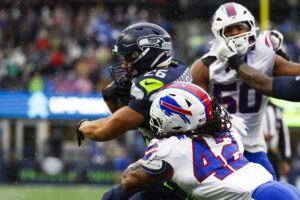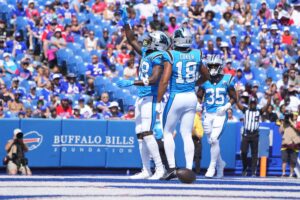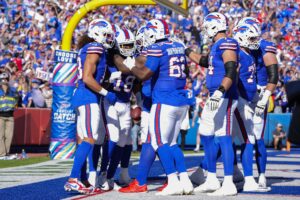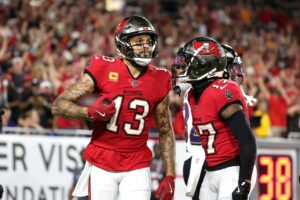The Atlanta Falcons without Devonta Freeman put up 34 points in Week Six against the Tampa Bay Buccaneers. Voices are getting louder asking why the Falcons offense produces more points when Freeman is not in the lineup. Is the Falcons offense really better without him?
The Atlanta Falcons Offense May Be Better Without Devonta Freeman
The Points Scored Discrepancy
Over the 24-game Steve Sarkisian era, the Falcons average 19 points per game in the games with Freeman. They average 33 points in the seven games without him. For this exercise, we will count the Dallas Cowboys game in 2017 as a game without Freeman since he left after two carries.
Falcons offense is humming along without Devonta Freeman. We noted this super weird point disparity when Freeman is out earlier this week. pic.twitter.com/Le1dbtHgvT
— Falcoholic Matt (@FalcoholicMatt) October 14, 2018
How do we explain that huge gap? There are theories going around in bunches. One is that Freeman simply is not a good back. Another thinks that Sark is simply too reliant on him when he is there. Hence, his gameplans become more conservative with Freeman in the lineup.
I decided to take a look at the numbers, to see if any of this holds up under close scrutiny.
The Run Game
We can measure rushing efficiency in various ways, but for this exercise, I will look at four metrics. Success rate, first down rate, touchdown rate, and yards per carry. Here is the breakdown of the Falcons running back runs 2017-2018 in games with and without Freeman:
|
2017-2018 Falcons rushing efficiency on running back runs |
||||
| Success Rate | First Down % | TD% | Y/A | |
| 17 games w/ Devonta Freeman | 46.1% | 22.3% | 3.1% | 4.2 |
| 7 games w/o Devonta Freeman | 40.8% | 14.9% | 3.6% | 2.9 |
Clearly, there is nothing about Freeman that drags the Falcons run game down. In fact, he actually elevates it to decent levels in the lineup. Touchdown rate is the only metric where the Falcons have a better rushing output. But the sample size is really small here. We are talking about six touchdowns between Tevin Coleman and Ito Smith over seven games. If Sark changed one play call in those games at the goal line, even that distinction disappears.
So if it isn’t the run game that suffers with Freeman, maybe it is the play calling?
The Play Calling
Let’s look at the playcalling to see if Freeman’s presence makes Sark a more conservative play caller.
|
2017-2018 Falcons play calling |
||
| Run % | Pass % | |
| 17 games w/ Devonta Freeman | 41% | 59% |
| 7 games w/o Devonta Freeman | 44% | 56% |
Again we see the opposite of what the fan theory posits. With Freeman in the lineup, Sark is actually more likely to pass the ball. It is when Freeman is not in the lineup that he tends to call a more run-heavy game.
The Passing Game
There is one final observation, which seems to drive the narrative around the point discrepancy. In games without Freeman, it is the passing game that actually looks dominant. We have seen this correlation happen in 2018 multiple times, so I checked those numbers as well.
|
2017-2018 Falcons passing efficiency |
||||||
| Success rate | Passer rating | Y/A | TD% | INT% | Sack% | |
| 17 games w/ Devonta Freeman | 46% | 86.8 | 7.4 | 3.1% | 2.1% | 6.5% |
| 7 games w/o Devonta Freeman | 60% | 125.1 | 9.2 | 7.7% | 0.9% | 3.8% |
So here we see the drving force of the points explosion without Freeman. Matt Ryan has been playing lights out in those seven games when he missed Freeman.
The Opponents
But before we draw a clear line, let’s remember that correlation isn’t causation. When we take a look at the strength of opposing defenses the Falcons faced in those two samples, we see some interesting results.
|
2017-2018 Falcons opponents |
||
| Average Pass Defense DVOA | Average Run Defense DVOA | |
| 17 games w/ Devonta Freeman | 15th | 16th |
| 7 games w/o Devonta Freeman | 25th | 16th |
This seems to be the main underlying reason for the weird split we observed. The Falcons run game basically faced an equally average set of opponents, whether with Freeman or without him. That lends credence to the notion that the improved run game we discussed in the earlier section is actually a product of his presence. He is the only variable that differs between the two sample sets.
But the pass game did not face two equally average sets of opponents. The seven games Freeman missed simply happened to be against a set of terrible pass defenses where a great quarterback like Ryan will have a field day any time, regardless of his backfield.
Now, the 2018 numbers are not finalized of course. Some of those defenses might turn out to be quite different from how they look now.
But as it stands after Week 6 of 2018, the Falcons certainly don’t produce points because Devonta Freeman misses a game.
They happen to face easy pass defenses when Freeman happens to miss a game.






